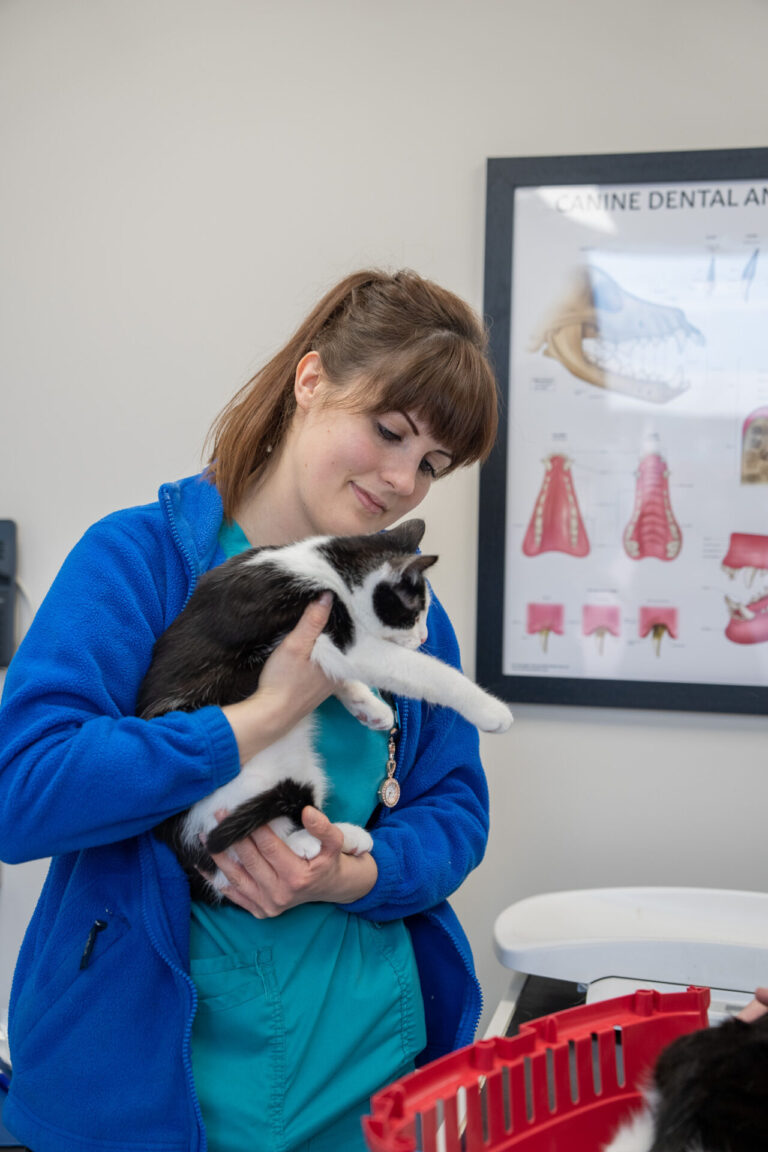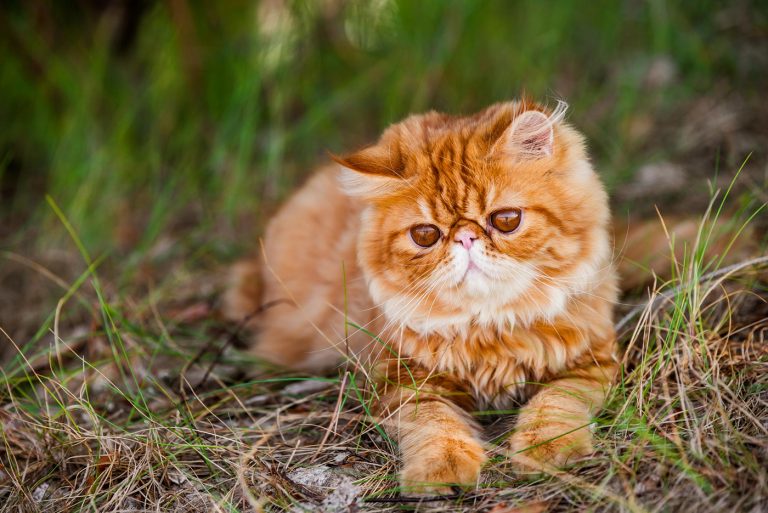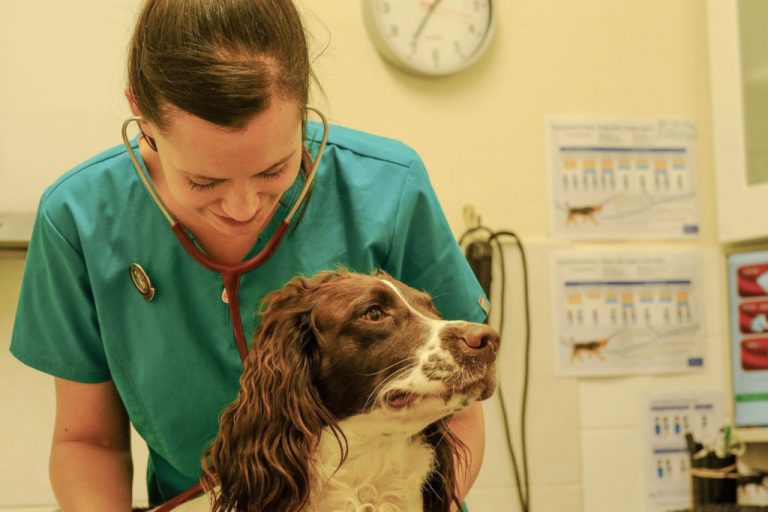
In 2024, the British Veterinary Nursing Association (BVNA) is celebrating two decades of campaigning during the month of May! To celebrate this year’s Veterinary Nursing Awareness Month, and to showcase the wonderful work of veterinary nurses around the world, we’re sharing an insight into #WhatVNsDo.
If you’re curious about veterinary nursing, or considering embarking on this field as a career, this blog has all you need to know.
RVNs have an essential role in caring for sick, injured and hospitalised animals, and are highly valued members of our team here at St Kitts.
Typical duties can include:
To become an RVN, you’ll need to complete a Veterinary Nursing qualification approved by the Royal College of Veterinary Surgeons.
There are two types of training:
A Level 3 Diploma in Veterinary Nursing usually takes between 2-3 years to complete full-time and is carried out alongside employment in a veterinary practice.
A Foundation Degree in Veterinary Nursing or BSc (Hons) Veterinary Nursing usually takes 3-4 years to complete. It is more academically focused however a significant proportion of the course involves work-based training at an approved training practice.
For the vocational training route, a minimum of 5 GCSE’s (alternative qualifications may also be considered) at grade C / 4 or above is required; these must include Science, Maths and English. Additional qualifications, such as A-levels, are required for enrolment onto a higher education course.
The majority of courses require students to have relevant work experience before applying, to develop animal handling and restraint skills, as well as obtain an insight into life as a veterinary nurse.
The demand for places on any Veterinary Nursing course is highly competitive. We always recommend that students gain as much practical experience as possible, regardless of the route they chose to take to qualify.
Work experience could include:
Here at St Kitts Vets, we’re proud to offer placements for both work experience and university students. Our placements provide hands-on experience and the opportunity to immerse yourself in the daily duties at our practices. It’s an excellent chance to practise the skills required and gain valuable insights into the industry.
To apply for a work experience placement, please click here.
To apply for a university placement, please click here.
If you’re interested in veterinary nursing and would like further information or support, please contact your local St Kitts practice:
St Kitts Vets Hartley Wintney: 01252 844044
St Kitts Vets Basingstoke: 01256 844944
Crookham Park Veterinary Centre: 01252 913990
Firgrove Veterinary Centre: 01252 877799

National Microchipping Month is supported every June and provides a great opportunity for us to remind dog and cat owners about the importance of getting your pet microchipped.
Microchipping your pets plays a significant part in your care for them and helps to ensure that you are happily reunited if they ever go missing. It has been mandatory to microchip all dogs in the UK since 2016, with the same set to apply to cats from 2023.

Microchipping is quick and safe and to your pet, will feel like getting their normal vaccinations. It only takes a few seconds, so there’s minimal discomfort. The chip itself is very small – about the size of grain of rice – and is implanted just under the skin on the back of your pet’s neck.
There are a handful of reasons why your pet can go missing; even the homeliest of dogs or cats can easily find themselves lost and confused if they wander a bit too far. If that ever does happen, your pet’s microchip will have a unique number that can be scanned by a vet, animal warden or police station in the UK to identify the animal’s details, including your emergency contact number so that they can be reunited with you safe and sound.
Unlike collars or tags that can be removed or lost, once your pet has been microchipped, their unique code will be linked to the national database and will last their lifetime.
Remember: If your contact details change for any reason (including your address), you need to make sure this information is updated.
This National Microchipping Month, please ensure your dog or cat is microchipped. Not only is it important for their welfare, but it will also give you peace of mind. Microchipping is included free with our Pet Care Plans, making it the purrfect time to sign up! Prices start from as little as £10.50 per month.
Get in contact with your local St Kitts branch to book an appointment today.
St Kitts Veterinary Centre: 01252 844044
Basingstoke Veterinary Centre: 01256 844944
Crookham Park Veterinary Centre: 01252 913990
Firgrove Veterinary Centre: 01252 877799

Veterinary Nursing Awareness Month (VNAM) was originally launched back in 2005 by the British Veterinary Nursing Association (BVNA). Its aim was simple: to raise awareness about the importance of the work veterinary nurses do within practice and the wider industry.
Because of this, we’ll be celebrating our wonderful veterinary nurses throughout May and would love you to join us!
Our veterinary nurses are integral to the team here at St Kitts Veterinary Group. They have the technical knowledge and expertise to ensure the smooth running of our four practices, caring for our customers’ pets with skill and empathy. They also:
There are two main pathways you can take to train as a veterinary nurse – vocational training or higher education. Regardless of which route you choose, you’ll need to make sure your course is accredited by the Royal College of Veterinary Surgeons (RCVS).
Vocational training
A vocational qualification is the fastest way to become a Registered Veterinary Nurse (RVN). You can complete a Level 3 Diploma in Veterinary Nursing, which can take as little as 2 years to complete full-time.
This route means you’ll spend time both in the classroom and working in practice, so you’ll get plenty of hands-on experience.
Higher education
A Degree in Veterinary Nursing often takes between 3-4 years to complete. This path is more academically focused, but you will still need to complete a minimum amount of practical work experience on placements with approved practices.
This route is great if you want to experience life at university and gain a degree, potentially opening up different career paths or further study down the line.
Keep an eye on our Facebook and Instagram pages throughout May, as we’ll be sharing more insight into our veterinary nurses and what they do at our practices!